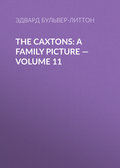
Эдвард Бульвер-Литтон
Pelham — Volume 06
"I must confess, for my part," said Lord Edward Neville (an author of some celebrity and more merit), "that I was exceedingly weary of those doleful ditties with which we were favoured for so many years. No sooner had Lord Byron declared himself unhappy, than every young gentleman with a pale face and dark hair, used to think himself justified in frowning in the glass and writing Odes to Despair. All persons who could scribble two lines were sure to make them into rhymes of "blight" and "night." Never was there so grand a penchant for the triste."
"It would be interesting enough," observed Vincent, "to trace the origin of this melancholy mania. People are wrong to attribute it to poor Lord Byron—it certainly came from Germany; perhaps Werter was the first hero of that school."
"There seems," said I, "an unaccountable prepossession among all persons, to imagine that whatever seems gloomy must be profound, and whatever is cheerful must be shallow. They have put poor Philosophy into deep mourning, and given her a coffin for a writing-desk, and a skull for an inkstand."
"Oh," cried Vincent, "I remember some lines so applicable to your remark, that I must forthwith interrupt you, in order to introduce them. Madame de Stael said, in one of her works, that melancholy was a source of perfection. Listen now to my author—
"'Une femme nous dit, et nous prouve en effet,
Qu'avant quelques mille ans l'homme sera parfait,
Qu'il devra cet etat a la melancolie.
On sait que la tristesse annonce le genie;
Nous avons deja fait des progres etonnans,
Que de tristes ecrits—que de tristes romans!
Des plus noires horreurs nous sommes idolatres,
Et la melancolie a gagne nos theatres.'"
"What!" cried I, "are you so well acquainted with my favourite book?"
"Your's!" exclaimed Vincent. "Gods, what a sympathy; [La Gastronomie, Poeme, par J. Berchoux.] it has long been my most familiar acquaintance; but—
"'Tell us what hath chanced to-day,
That Caesar looks so sad?'"
My eye followed Vincent's to ascertain the meaning of this question, and rested upon Glanville, who had that moment entered the room. I might have known that he was expected, by Lady Roseville's abstraction, the restlessness with which she started at times from her seat, and as instantly resumed it; and her fond expecting looks towards the door, every time it shut or opened, which denoted so strongly the absent and dreaming heart of the woman who loves.
Glanville seemed paler than usual, and perhaps even sadder; but he was less distrait and abstracted: no sooner did he see, than he approached me, and extended his hand with great cordiality. His hand, thought I, and I could not bring myself to accept it; I merely addressed him in the common-place salutation. He looked hard and inquisitively at me, and then turned abruptly away. Lady Roseville had risen from her chair—her eyes followed him. He had thrown himself on a settee near the window. She went up to him, and sate herself by his side. I turned—my face burnt—my heart beat—I was now next to Ellen Glanville; she was looking down, apparently employed with some engravings, but I thought her hand (that small, delicate, Titania hand,) trembled.
There was a pause. Vincent was talking with the other occupiers of the table; a woman, at such times, is always the first to speak. "We have not seen you, Mr. Pelham," said Ellen, "since your return to town."
"I have been very ill," I answered, and I felt my voice falter. Ellen looked up anxiously at my face; I could not brook those large, deep, tender eyes, and it now became my turn to occupy myself with the prints.
"You do look pale," she said, in a low voice. I did not trust myself with a further remark—dissimulator as I was to others, I was like a guilty child before the woman I loved. There was another pause—at last Ellen said, "How do you think my brother looks?"
I started; yes, he was her brother, and I was once more myself at that thought. I answered so coldly and almost haughtily, that Ellen coloured, and said, with some dignity, that she should join Lady Roseville. I bowed slightly, and she withdrew to the countess. I seized my hat and departed- -but not utterly alone—I had managed to secrete the book which Ellen's hand had marked; through many a bitter day and sleepless night, that book has been my only companion; I have it before me now, and it is open at a page which is yet blistered with the traces of former tears.
CHAPTER LXVIII
Our mistress is a little given to philosophy: what disputations shall we have here by and by!
—Gil Blas.
It was now but seldom that I met Ellen, for I went little into general society, and grew every day more engrossed in political affairs. Sometimes, however, when, wearied of myself, and my graver occupations, I yielded to my mother's solicitations, and went to one of the nightly haunts of the goddess we term Pleasure, and the Greeks, Moria, the game of dissipation (to use a Spanish proverb) shuffled us together. It was then that I had the most difficult task of my life to learn and to perform; to check the lip—the eye—the soul—to heap curb on curb, upon the gushings of the heart, which daily and hourly yearned to overflow; and to feel, that while the mighty and restless tides of passion were thus fettered and restrained, all within was a parched and arid wilderness, that wasted itself, for want of very moisture, away. Yet there was something grateful in the sadness with which I watched her form in the dance, or listened to her voice in the song; and I felt soothed, and even happy, when my fancy flattered itself, that her step never now seemed so light, as it was wont to be when in harmony with mine, nor the songs that pleased her most, so gay as those that were formerly her choice.
Distant and unobserved, I loved to feed my eyes upon her pale and downcast cheek; to note the abstraction that came over her at moments, even when her glance seemed brightest, and her lip most fluent; and to know, that while a fearful mystery might for ever forbid the union of our hands, there was an invisible, but electric chain, which connected the sympathies of our hearts.
Ah! why is it, that the noblest of our passions should be also the most selfish?—that while we would make all earthly sacrifice for the one we love, we are perpetually demanding a sacrifice in return; that if we cannot have the rapture of blessing, we find a consolation in the power to afflict; and that we acknowledge, while we reprobate, the maxim of the sage: 'L'on veut faire tout le bonheur, ou, si cela ne se peut ainsi, tout le malheur de ce qu'on aime.'"
The beauty of Ellen was not of that nature, which rests solely upon the freshness of youth, nor even the magic of expression; it was as faultless as it was dazzling; no one could deny its excess or its perfection; her praises came constantly to my ear into whatever society I went. Say what we will of the power of love, it borrows greatly from opinion; pride, above all things, sanctions and strengthens affection. When all voices were united to panegyrize her beauty—when I knew, that the powers of her wit—the charms of her conversation—the accurate judgment, united to the sparkling imagination, were even more remarkable characteristics of her mind, than loveliness of her person, I could not but feel my ambition, as well as my tenderness, excited; I dwelt with a double intensity on my choice, and with a tenfold bitterness on the obstacles which forbade me to indulge it.
Yet there was one circumstance, to which, in spite of all the evidence against Reginald, my mind still fondly and eagerly clung. In searching the pockets of the unfortunate Tyrrell, the money he had mentioned to me as being in his possession, could not be discovered. Had Glanville been the murderer, at all events he could not have been the robber; it was true that in the death scuffle, which in all probability took place, the money might have fallen from the person of the deceased, either among the long grass which grew rankly and luxuriantly around, or in the sullen and slimy pool, close to which the murder was perpetrated; it was also possible, that Thornton, knowing the deceased had so large a sum about him, and not being aware that the circumstance had been communicated to me or any one else, might not have been able (when he and Dawson first went to the spot,) to resist so great a temptation. However, there was a slight crevice in this fact, for a sunbeam of hope to enter, and I was too sanguine, by habitual temperament and present passion, not to turn towards it from the general darkness of my thoughts.
With Glanville I was often brought into immediate contact. Both united in the same party, and engaged in concerting the same measures, we frequently met in public, and sometimes even alone. However, I was invariably cold and distant, and Glanville confirmed rather than diminished my suspicions, by making no commentary on my behaviour, and imitating it in the indifference of his own. Yet, it was with a painful and aching heart, that I marked, in his emaciated from and sunken cheek, the gradual, but certain progress of disease and death; and while all England rung with the renown of the young, but almost unrivalled orator, and both parties united in anticipating the certainty and brilliancy of his success, I felt how improbable it was, that, even if his crime escaped the unceasing vigilance of justice, this living world would long possess any traces of his genius but the remembrance of his name. There was something in his love of letters, his habits of luxury and expence, the energy of his mind—the solitude, the darkness, the hauteur, the reserve, of his manners and life, which reminded me of the German Wallenstein; nor was he altogether without the superstition of that evil, but extraordinary man. It is true, that he was not addicted to the romantic fables of astrology, but he was an earnest, though secret, advocate of the world of spirits. He did not utterly disbelieve the various stories of their return to earth, and their visits to the living; and it would have been astonishing to me, had I been a less diligent observer of human inconsistencies, to mark a mind otherwise so reasoning and strong, in this respect so credulous and weak; and to witness its reception of a belief, not only so adverse to ordinary reflection, but so absolutely contradictory to the philosophy it passionately cultivated, and the principles it obstinately espoused.
One evening, I, Vincent, and Clarendon, were alone at Lady Roseville's, when Reginald and his sister entered. I rose to depart; la belle Contesse would not suffer it; and when I looked at Ellen, and saw her blush at my glance, the weakness of my heart conquered, and I remained.
Our conversation turned partly upon books, and principally on the science du coeur et du monde, for Lady Roseville was un peu philosophe, as well as more than un peu litteraire; and her house, like those of the Du Deffands and D'Epinays of the old French regime, was one where serious subjects were cultivated, as well as the lighter ones; where it was the mode to treat no less upon things than to scandalize persons; and where maxims on men and reflections on manners, were as much in their places, as strictures on the Opera and invitations to balls.
All who were now assembled were more or less suited to one another; all were people of the world, and yet occasional students of the closet; but all had a different method of expressing their learning or their observations. Clarendon was dry, formal, shrewd, and possessed of the suspicious philosophy common to men hacknied in the world. Vincent relieved his learning by the quotation, or metaphor, or originality of some sort with which it was expressed. Lady Roseville seldom spoke much, but when she did, it was rather with grace than solidity. She was naturally melancholy and pensive, and her observations partook of the colourings of her mind; but she was also a dame de la cour, accustomed to conceal, and her language was gay and trifling, while the sentiments it clothed were pensive and sad.
Ellen Glanville was an attentive listener, but a diffident speaker. Though her knowledge was even masculine for its variety and extent, she was averse to displaying it; the childish, the lively, the tender, were the outward traits of her character—the flowers were above, but the mine was beneath; one noted the beauty of the former—one seldom dreamt of the value of the latter.
Glanville's favourite method of expressing himself was terse and sententious. He did not love the labour of detail: he conveyed the knowledge of years in a problem. Sometimes he was fanciful, sometimes false; but, generally, dark, melancholy, and bitter.
As for me, I entered more into conversation at Lady Roseville's than I usually do elsewhere; being, according to my favourite philosophy, gay on the serious, and serious on the gay; and, perhaps, this is a juster method of treating the two than would be readily imagined: for things which are usually treated with importance, are, for the most part, deserving of ridicule; and those which we receive as trifles, swell themselves into a consequence we little dreamt of, before they depart.
Vincent took up a volume: it was Shelley's Posthumous Poems. "How fine," said he, "some of these are; but they are fine fragments of an architecture in bad taste: they are imperfect in themselves, and faulty in the school they belonged to; yet, such as they are, the master-hand is evident upon them. They are like the pictures of Paul Veronese—often offending the eye, often irritating the judgment, but redolent of something vast and lofty—their very faults are majestic—this age, perhaps no other will ever do them justice—but the disciples of future schools will make glorious pillage of their remains. The writings of Shelley would furnish matter for a hundred volumes: they are an admirable museum of ill-arranged curiosities—they are diamonds, awkwardly set; but one of them, in the hands of a skilful jeweller, would be inestimable: and the poet of the future, will serve him as Mercury did the tortoise in his own translation from Homer—make him 'sing sweetly when he's dead!' Their lyres will be made out of his shell."
"If I judge rightly," said Clarendon, "his literary faults were these: he was too learned in his poetry, and too poetical in his learning. Learning is the bane of a poet. Imagine how beautiful Petrarch would be without his platonic conceits: fancy the luxuriant imagination of Cowley, left to run wild among the lofty objects of nature, not the minute peculiarities of art. Even Milton, who made a more graceful and gorgeous use of learning than, perhaps, any other poet, would have been far more popular if he had been more familiar. Poetry is for the multitude—erudition for the few. In proportion as you mix them, erudition will gain in readers, and poetry lose."
"True," said Glanville; "and thus the poetical, among philosophers, are the most popular of their time; and the philosophical among poets, the least popular of theirs."
"Take care," said Vincent, smiling, "that we are not misled by the point of your deduction; the remark is true, but with a certain reservation, viz. that the philosophy which renders a poet less popular, must be the philosophy of learning, not of wisdom. Wherever it consists in the knowledge of the plainer springs of the heart, and not in abstruse inquiry into its metaphysical and hidden subtleties, it necessarily increases the popularity of the poem; because, instead of being limited to the few, it comes home to every one. Thus it is the philosophy of Shakspeare, Byron, Horace, Pope, Moliere, which has put them into every one's hands and hearts—while that of Propertius, even of Lucretius, of Cowley, and Shelley, makes us often throw down the book, because it fatigues us with the scholar. Philosophy, therefore, only sins in poetry, when, in the severe garb of learning, it becomes 'harsh and crabbed,' and not 'musical, as is Apollo's lute.'"
"Alas!" said I, "how much more difficult than of yore, education is become—formerly, it had only one object—to acquire learning; and now, we have not only to acquire it, but to know what to do with it when we have—nay, there are not a few cases where the very perfection of learning will be to appear ignorant."
"Perhaps," said Glanville, "the very perfection of wisdom may consist in retaining actual ignorance. Where was there ever the individual who, after consuming years, life, health, in the pursuit of science, rested satisfied with its success, or rewarded by its triumph? Common sense tells us that the best method of employing life, is to enjoy it. Common sense tells us, also, the ordinary means of this enjoyment; health, competence, and the indulgence, but the moderate indulgence, of our passions. What have these to do with science?"
"I might tell you," replied Vincent, "that I myself have been no idle nor inactive seeker after the hidden treasures of mind; and that, from my own experience, I could speak of pleasure, pride, complacency, in the pursuit, that were no inconsiderable augmenters of my stock of enjoyment: but I have the candour to confess, also, that I have known disappointment, mortification, despondency of mind, and infirmity of body, that did more than balance the account. The fact is, in my opinion, that the individual is a sufferer for his toils, but then the mass is benefited by his success. It is we who reap, in idle gratification, what the husbandman has sown in the bitterness of labour. Genius did not save Milton from poverty and blindness—nor Tasso from the madhouse—nor Galileo from the inquisition; they were the sufferers, but posterity the gainers. The literary empire reverses the political; it is not the many made for one—it is the one made for many; wisdom and genius must have their martyrs as well as religion, and with the same results, viz: semen ecclesioeest sanguis martyrorum. And this reflection must console us for their misfortunes, for, perhaps, it was sufficient to console them. In the midst of the most affecting passage in the most wonderful work, perhaps, ever produced, for the mixture of universal thought with individual interest—I mean the two last cantos of Childe Harold—the poet warms from himself at his hopes of being remembered
"'In his line
With his land's language.'
"And who can read the noble and heart-speaking apology of Algernon Sidney, without entering into his consolation no less than his misfortunes? Speaking of the law being turned into a snare instead of a protection, and instancing its uncertainty and danger in the times of Richard the Second, he says, 'God only knows what will be the issue of the like practices in these our days; perhaps he will in his mercy speedily visit his afflicted people; I die in the faith that he will do it, though I know not the time or ways.'"
"I love," said Clarendon, "the enthusiasm which places comfort in so noble a source; but, is vanity, think you, a less powerful agent than philanthropy? is it not the desire of shining before men that prompts us to whatever may effect it? and if it can create, can it not also support? I mean, that if you allow that to shine, to eclater, to enjoy praise, is no ordinary incentive to the commencement of great works, the conviction of future success for this desire becomes no inconsiderable reward. Grant, for instance, that this desire produced the 'Paradise Lost,' and you will not deny that it might also support the poet through his misfortunes. Do you think that he thought rather of the pleasure his work should afford to posterity, than of the praises posterity should extend to his work? Had not Cicero left us such frank confessions of himself, how patriotic, how philanthropic we should have esteemed him; now we know both his motive and meed was vanity, may we not extend the knowledge of human nature which we have gained in this instance by applying it to others? For my part, I should be loth to inquire how great a quantum of vanity mingled with the haughty patriotism of Sidney, or the unconquered spirit of Cato."
Glanville bowed his head in approval. "But," observed I, "why be so uncharitable to this poor, and persecuted principle, since none of you deny the good and great actions it effects; why stigmatize vanity as a vice, when it creates, or, at least participates in, so many virtues? I wonder the ancients did not erect the choicest of their temples to its worship. Quant a moi, I shall henceforth only speak of it as the primum mobile of whatever we venerate and admire, and shall think it the highest compliment I can pay to a man, to tell him he is eminently vain."







